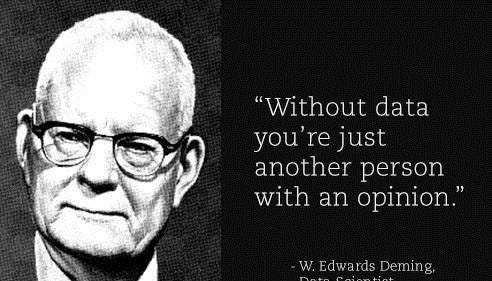GCS doubles down on data in new Evaluation tool
Plus... why data means it's not all plane sailing for Ms Swift, four free Webinars, Gov must up its data game for efficiency and 5 data comms trends for 2024
Data stars in new GCS Evaluation Cycle tool
The Government Communications Service has launched a new Evaluation Cycle tool, replacing the excellent and popular but slightly aging Evaluation Framework 2.0 - and as you might expect, data plays a key role.
The Cycle provides a flexible framework for measuring success across all communication activities, promoting continuous learning and innovation while integrating best practices for better impact and future planning.
Launching the new resource, GCS CEO Simon Baugh said: “This new GCS Evaluation Cycle will help us shift our focus further to building on data and insights, supporting all GCS communicators in driving creative innovation and delivering impactful results”.
What does this mean for comms pros?
In a time when many in public sector comms will be facing reduced budgets and possibly smaller teams to deliver activity, this excellent guidance can help you ensure efficient use of resources, informed tactics based on evidence (not opinion), and demonstrable outcomes that go beyond vanity metrics.
In his introduction to the toolkit, Simon Baugh rightly talks about evaluation as “an intrinsic element of communication planning from the outset”, and the need to ensure “valuable insights are used to inform what works and what doesn’t from the very start of a communications campaign, however large or small”.
The section on Calculating Return on Investment (ROI) particularly caught the eye, giving worked examples of how to do things like base lining and trend forecasting using available service data (this is data that some public sector comms pros have said to me they find difficult to get their hands on and/or hard to work with - see here for a little free session I’m running on this).
A data angle on Taylor Swift
(Image: ChatGPT 4.0)
No, really.
According to some, Swift is the most powerful person in the world , as she smashes all sorts of records with her Eras World Tour, brings legion new fans to NFL thanks to her burgeoning relationship with a Superbowl winner, and looks set to play a pivotal role in the US Election based on who she endorses.
But it’s not all plain (or should that be plane?) sailing for the 34-year-old megastar as she faces increasing scrutiny over her use of private jets - all stemming from analysis of public data.
Openly available data on aircraft movements (it’s not hard to spot her ride, with the tail number N898TS), combined with carbon emissions data, has been used to shed light on the sizeable carbon footprint of the singer songwriter’s jet-setting activities.
In 2022, Swift topped the list of celebrities with the highest private jet CO2 emissions, according to some neat work by digital PR outfit Yard - it found that her jet emissions were about 1,185 times more than the average person's total annual emissions. It has been reported she sold one of her two private jets after receiving negative publicity about her carbon footprint.
More recently, Swift threatened to sue student Jack Sweeney for using public data to share details of her many flights online (with a one day delay), saying that the information poses "an imminent threat to [her] safety and wellbeing”.
What does this mean for Comms Pros?
Whether you are a Swifty or not, this is another example of how data-driven stories are now an everyday occurrence in the mainstream media, often attracting huge coverage.
Away from some specialist agencies, the communications profession has not followed journalism’s data-savvy lead, and data literacy and comfort remains low. CIPR began to talk about the opportunities of Big Data in 2021, but the focus has now shifted to the glitzier Artificial Intelligence.
There are risks in teams ‘not doing data’; they won’t be thinking critically about what negative stories might lie in their own organisation’s public data (because they are not looking at it). Opportunities are likely being missed to innovate (at low-cost) for storytelling, and to unearth novel and engaging campaign hooks that can drive reach and engagement with audiences.
Speaking of which… free data webinars!!
In these times of financial pressure in the public sector - and thin training budgets - I'm mega-pleased to have teamed up with Darren Caveney from comms2point0 to launch a series of Data Bites webinars to help not-for-profit communications professionals do more with data in 2024.
Now open for booking are;
Thursday 22nd Feb - Facing Fears : Data Basics (45 mins)
Thursday 29th Feb - Finding and Asking for Data (30 mins)
Thursday 7th March - Five Ways Data Could Superpower Your Comms – (30 mins)
Thursday 14th March - Smashing Spreadsheets - five great functions for insight (30 mins)
And... as a bonus... invest in your development and attend at least 3 out of 4 sessions, to unlock a final, free 1-hour session on March 21st on Using AI for instant actionable insight from difficult data. Booking soon, watch this space.
The booking link for all four webinars can be found here.
Spending boss calls for Gov to get more data savvy
In his annual speech to Parliament, National Audit Office head Gareth Davies has called for the Government to up its data game to “drive better productivity and release resources”
Davies described “better data” as one of three enablers of productivity in the public sector. “Consistent definitions, standards and, above all, quality are essential if citizens are to see service levels rise and costs fall. Without it, government ambitions on artificial intelligence will not be realised, as poor data means arriving at wrong answers, only faster.”
What does this mean for comms pros?
Pay attention to that last line; as the Open Data Institute’s founder Sir Nigel Shadbolt has said, without good data there can be no good AI. The relentless development of Large Language Models (LLMs) offers all manner of opportunities for efficiency, ideation and insights. But hallucination remains a problem, and if you are crunching data for research, reporting or evaluation, you’ll need the data literacy and skills to sense-check what AI is telling you before you do anything important with it.
BLOG: 5 Ways Data Will Shape Communications in 2024
Thanks to Darren Caveney at comms2point0 for publishing my thoughts on the year ahead in terms of data in the comms world.
In short;
📈 In constrained and complex times the need for data in strategic comms will continue to grow
🔭 Microsoft's AI will make superpowered - and safe - data insights a reality for in-house teams
✍️ Journalism will keep showing the way with data - and tease what's possible
🖼️ Telling visual stories with data will become much easier
🏆 Data will play a key role in award-winning work
D tells me it was the second most read blog on the site in Jan, which is nice. Have a read and let me know what you think.
Data Communications Chronicles is written by Alex Waddington, founder of Whetstone Communications, which helps charity, public sector and higher education comms teams to use data to be more effective. To get in touch to discuss how we could work together email alex@whetstonecomms.com.




